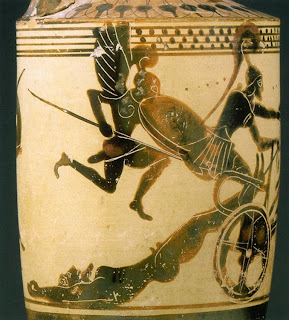 Detail of black-figure lekythos. Eretria.
Detail of black-figure lekythos. Eretria.By the Diosphos Painter.
Clay. Ca. 490 B.C.
Paris, Louvre Museum.
Today's trivia question to prepare you for the “Clash of Civilizations”.
During the Trojan War who was the greatest Trojan warrior? Who was the greatest Grecian warrior?Answer Hector, Troy and Achilles, Greece.
How’s the Library doing? Part 4
The radical Islamic world is now at war at with Western Civilization. Our young men and woman are in armed conflict defending our concepts of civilization. We admire the American soldier, guided by reason (Logos), superior training, superior equipment, superior tactics, and superior strategy. We do not admire the suicide bomber, inspired by jihad, the call of religious leaders for war. Our jihadic enemy yearns death. To him reason, logic, and justice don’t matter.
In America we question our leaders, we are free to doubt their wisdom, we do not yearn death at their behest. How is it that these two civilizations came to have such differing views of war and the role of the warrior?
The archetype of the Western Civilized warrior was born on the pages of a book 2,800 years ago when Homer wrote the Iliad. Homer describes a few days, at most a month, in the 10 year Grecian siege of the great walled city of Troy. You know the story of Troy: Helen of Troy, The Trojan horse. But Homer tells very little of that story in the Iliad. The story is about great warriors. These warriors knew fear and doubt. They knew courage and honor. If you want to understand what Western Civilization really means, I suggest that you read this book.
So how is our library doing in regards to having the Iliad on the shelf? There are several modern English translations in print. The one that our library has is Richmond Lattimore's version. The library also has an excellent critical text based on this translation. I can recommend this translation.
However, there are 2 more modern translations the library should acquire. These 2 newer translations have been accepted critically as the best modern English translations available. Both have excellent introductory text.
Robert Fagles (translator), Bernard Knox (introduction) 1990
Stanley Lombardo (translator), Sheila Murnaghan (Introduction), 1997
From http://en.wikipedia.org/wiki/Iliad
“Robert Fagles and Stanley Lombardo both follow the Greek closely but are bolder in adding dramatic significance to conventional and formulaic Homeric language.
Lombardo has chosen an American idiom that is much more colloquial than the other translations.”
The Grecian Urn at the top shows Achilles on a chariot dragging Hector’s body.
No comments:
Post a Comment